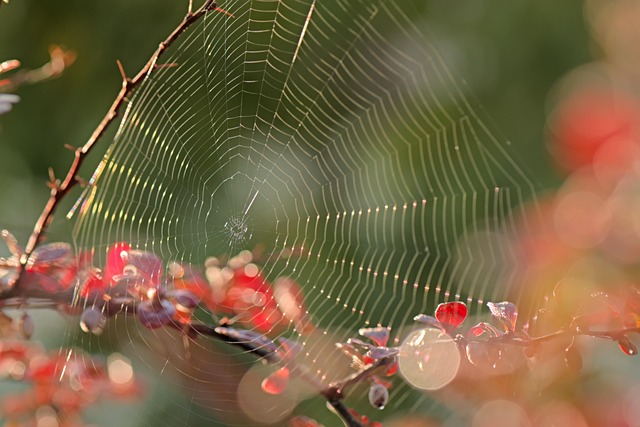Understanding spider behavior is crucial for effective spider infestation solutions. Spiders are attracted to dark, tight spaces and areas with abundant food sources. Regular cleaning, decluttering, sealing entry points, and removing food and water sources can deter them. Creating a bright, clean, and fragrant environment further repels spiders. Natural repellents and combining these methods significantly reduce the likelihood of infestation. For severe or recurring infestations, professional help is essential for advanced techniques and tailored strategies. Regular inspections prevent future invasions and ensure a spider-free environment.
Tired of sharing your space with unwanted guests? Understanding and reducing spider attractants is key to achieving a pest-free environment. This comprehensive guide offers expert advice on navigating the intricate world of spider behavior, identifying hidden attractants in your home, and creating an unwelcoming environment through natural deterrents. Learn effective cleaning practices for prevention and when to seek professional help for persistent spider infestation solutions.
Understanding Spider Behavior: Identifying Attractants in Your Home
Understanding Spider Behavior: Identifying Attractants in Your Home
Spiders are intricate creatures with specific behaviors and preferences that influence their choice of habitats. Knowing their habits can be a powerful tool in spider infestation solutions. These arachnids are naturally drawn to dark, tight spaces, as these provide shelter and protection from predators. They often seek out areas where food is abundant, such as places with high insect activity or where organic debris accumulates. In residential settings, spiders might be attracted by cracks, crevices, and voids in walls, floors, and ceilings, offering easy access to their preferred hiding spots.
Identifying these attractants is the first step in implementing effective spider control measures. Regular cleaning and maintenance can significantly reduce potential habitats. Decluttering spaces, sealing entry points, and removing sources of food or water can deter spiders from entering your home. Pay close attention to areas around windows, doors, and any gaps where utility pipes pass through walls, as these are common access points for spiders seeking new territories.
Creating an Unwelcoming Environment: Deterring Spiders Naturally
Creating an Unwelcoming Environment: Deterring Spiders Naturally
One effective strategy in spider infestation solutions is transforming your space into an environment that discourages these arachnids from setting up camp. Spiders are naturally drawn to dark, secluded spaces where they can hunt and build their webs undetected. To combat this, ensure your living areas are well-lit, especially corners and crevices, as bright light acts as a deterrent. Regularly cleaning and decluttering your home, removing clutter that provides hiding spots, is another key step. Spiders thrive in messy environments, so keeping things tidy will make your space less appealing to them.
Natural deterrents like citronella, peppermint oil, and lavender can also be used to create an aromatic barrier against spiders. These scents are known to repel spiders naturally without the need for harsh chemicals. Planting certain herbs like rosemary, thyme, or marigolds around your property can also help keep spiders at bay, as these plants contain compounds that are unpleasantly scented to arachnids. By combining these natural methods with regular cleaning practices, you can significantly reduce the likelihood of a spider infestation and create a more welcoming—and spider-free—living space.
Effective Cleaning and Maintenance Practices for Spider Prevention
Regular cleaning and maintenance are essential spider infestation solutions. Dusting and vacuuming frequently can help remove webbing, egg sacs, and dead spiders, which act as attractants. Focus on areas where spiders tend to hide, such as corners, cracks, and dark spaces behind furniture or appliances. Use a damp cloth to wipe down surfaces, as spiders are attracted to moisture, and consider using a vacuum with an attachment designed for detailed cleaning to reach hard-to-reach places.
In addition to regular cleaning, maintaining a clutter-free environment is crucial. Spiders hide in cluttered spaces, so decluttering your home or workspace can significantly reduce their presence. Store items in sealed containers, especially those made of cardboard or fabric, which spiders find appealing. Regularly inspect and repair any tears or holes in fabrics or materials that could provide entry points for spiders.
Professional Help: When to Call for Expert Spider Infestation Solutions
If a spider invasion has taken over your space, it might be time to consider professional help. While DIY methods can be effective for minor issues, a severe or recurring spider infestation requires specialized knowledge and equipment. Professional spider control services offer advanced techniques, including targeted treatments, insect growth regulators, and preventative measures tailored to specific species.
These experts can identify the type of spiders causing the problem and implement safe, efficient strategies to eliminate them and prevent future invasions. Regular professional inspections are also beneficial for identifying entry points and potential breeding grounds, ensuring your space remains spider-free in the long term. When faced with a challenging or persistent spider infestation, don’t hesitate to reach out to professionals for effective spider infestation solutions.
By implementing these expert strategies, you can significantly reduce spider attractants in your space. Understanding their behavior and identifying key attractants is the first step towards creating an unwelcoming environment for spiders. Adopting natural deterrents and maintaining a clean, tidy home are powerful prevention methods. For severe cases, professional spider infestation solutions offer effective treatments. With these comprehensive approaches, you can take control of your living space and bid farewell to unwanted arachnid visitors.
